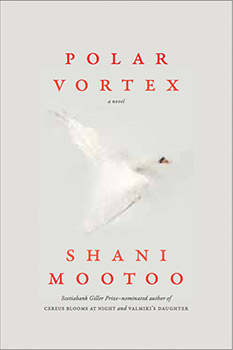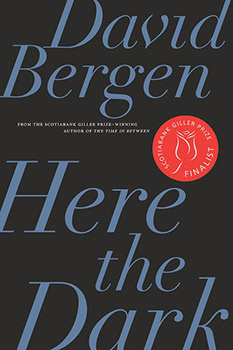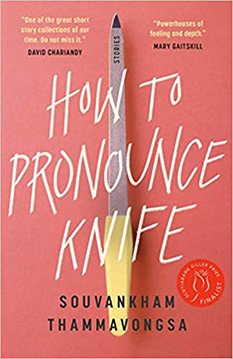Polar Vortex, Shani Mootoo (Toronto: Book*hug, 2020)

Polar Vortex opens with a dream. Priya, a lesbian of Indian descent, immigrant from Trinidad, now settled with her white spouse, Alex, in white bread Prince Edward County, awakes from the riotous colours of an Indian wedding ritual which culminates in sex with a man, not with any man, but with Prakash, her oldest friend in Canada whom she met as an undergraduate when they were both newly arrived and trying to get their bearings in their new home. What does this mean? she wonders. In particular, why, as a lesbian, would she dream of sex with a man? She has not seen Prakash in six years, not since she settled with Alex. But recently Prakash has reached out to Priya and has asked to visit, to stay overnight at their house. The day for his visit has arrived and yet, on this very day, Priya has awoken from a dream of sex with him.
What follows might best be described as conforming to the traditional Japanese literary value of delicacy. I know that sounds odd in reference to a novel that hasn’t a Japanese bone in its body; even so, Mootoo proceeds by subtle increments to expose both the fragility of Priya’s relationship with Alex and a striking lack of personal insight into the matter of her sexual identity. We pass more than half the novel witnessing Priya’s thoughts and feelings play out as she anticipates the arrival of Prakash. To the extent that the novel holds a dramatic narrative at all, it is one the reader cobbles together from stray memories and bits of conversation. The real drama lies in the question whether the relationship between Priya and Alex can survive the arrival of Prakash. Mootoo is masterful in laying out a double vision. The reader shares with Priya all the facts at hand, yet Priya seems frustratingly oblivious to what the reader knows is an impending disaster.
A little over halfway through the novel, point of view switches from Priya to Alex. Prakash has arrived while Priya is out driving a friend home, so Alex has an opportunity to form an impression without Priya’s mediation. Personally, I find the switch in point of view jarring. I was enjoying the way Mootoo developed Priya as an unreliable narrator and expected her to sustain it to the end of the novel. The only reason I can think to use the same unreliable narrator tactic with Alex is to expose the blind spots of an established white woman in relation to the shared experiences of immigrants to Canada. In particular, Alex seems concerned with the fact that Prakash asks no questions of Alex, not even by way of trivial chit chat, even though he is a guest in their home. Instead, he does all the talking, hellbent on laying out the account of his family’s escape from Uganda during the insanity of Idi Amin’s rule. More than forty years afterwards, the memory of those events remains raw. What especially sticks in his craw is the fact that no one would have them. When at last they made it to Canada, their reception was grudging, nothing like the reception of Syrian refugees today. Alex’s concern for social niceties seems trivial by comparison.
In the final section of the novel, point of view returns to Priya as we join Priya and Prakash for a drive through Prince Edward County. Again, the flip is jarring and more pointedly draws attention to the narrative inconsistency we’ve already experienced. To my way of thinking, it mars a novel that otherwise draws to a brilliant and satisfying conclusion with a character who exhibits an infuriating yet all-too-human lack of personal responsibility and insight.
The Glass Hotel, Emily St. John Mandel (Toronto: HarperCollins, 2020)

It seems somehow fitting that a novel featuring a Bernie Madoff look-alike should be up for an award named for and sponsored by a major financial institution (market cap of US$57B at time of posting). Like Bernie Madoff, Jonathan Alkaitis operates a legitimate brokerage which provides cover for a shadowy wealth management and advisory subsidiary which subsequently proves to be a massive Ponzi scheme. Like Madoff’s investment fraud, Jonathan Alkaitis’s scheme unravelled late in 2008 shortly after the collapse of the Lehman Bros. investment bank which precipitated a global financial meltdown whose consequences haunt us to this day. And like Madoff’s demise, Alkaitis’s arrest and subsequent conviction produced untold collateral wreckage.
When the bomb goes off, the person sitting closest to ground zero is Vincent, a young woman who plays trophy wife to the much older Jonathan Alkaitis. I say “plays” because, like everything else in Alkaitis’s life, the marriage is a role in a carefully directed drama. There is no legal relationship between the two; the point of their arrangement is to create the impression of success. Vincent is the relationship equivalent of a cheap Rolex knock-off or off-the-rack dress with sewn-in designer label. While she enjoys her fake husband’s companionship and the lifestyle he cultivates, she intuits without understanding that this is a time-limited arrangement. Because Vincent has no emotional investment in the arrangement, when the time comes, she finds it easy to walk away from it all and into a new life.
Vincent and Jonathan Alkaitis met because Alkaitis owned a hotel near Vincent’s hometown on the north end of Vancouver Island. Vincent was bartending one evening when an unseemly incident occurred: someone had use acid to etch a message on a window of the hotel’s lounge: Why don’t you swallow broken glass? It appears that the intended recipient of the message was Jonathan Alkaitis but failed because Alkaitis didn’t arrive at the hotel for another two days. Meanwhile, the manager deduced that the culprit was Vincent’s half brother, Paul, and fired him. Paul had chosen to use acid on the glass because he had previously witnessed Vincent vandalizing a school window in precisely the same way. The only thing different was the message: Sweep me up. By the time Alkaitis arrives, the message has been obscured and there is nothing to divert his attention from the beautiful young woman working at the bar.
The novel is framed by images of Vincent tumbling from the deck of a container ship and into the water below, falling head for toes, almost as if in a slo-mo sequence, almost with a cinematic quality. In fact, the entire novel is blocked out in such a way that it creates the impression of a feature film. Vincent herself goes everywhere with a video camera shooting five-minute segments of whatever moves her. She is trying to shoot a five-minute segment of a storm at sea when she gets swept overboard.
I’m fascinated by the sensory range that writers can evoke. Some are more obviously visual. Others write more like lyricists or librettists with an obvious affinity for the auditory sense. St. John Mandel leans more to the visual. From the graffiti etched on glass to the portrait of Alkaitis’s late brother to Vincent’s gallery visits in Manhattan. For some writers, the play between the written and the visual is part of the point. Ali Smith comes to mind. Her ventures into the liminal territory between writing and painting challenge the clean distinctions that accompany conventional forms. In effect, Smith queers the novel as a way to comment upon the clean distinctions we apply to concerns of gender and sexuality. Nothing that subtle is at play here.
Other writers, like Elmore Leonard, write like they’re novelizing a screenplay. They write with the visual in mind perhaps because that’s the mainstay of our movie-going Netflix-surfing culture. St. John Mandel’s writing has more in common with Elmore Leonard than Ali Smith. Don’t get me wrong. The Glass Hotel is a great read. But it’s up for a literary prize. I mean, come on. This is a novel crying out to be rewritten as a Hollywood movie treatment. If we took the five Scotiabank Giller nominees and played the Sesame Street game of “one of these is not like the others” we’d have to point our fingers at The Glass Hotel.
Here the Dark, David Bergen (Windsor: Biblioasis, 2020)

In my estimation, and I’m not alone in this view, one of the finest collections of short stories ever published is Denis Johnson’s Jesus’ Son. He writes stripped-to-the-bone prose about mid-western Americans drifting through marginal spaces like truck stops and bus depots. The closest his characters have to a cultural anchor is a specious Christianity which, in spite of its intentions, injects into their lives a degree of absurdity that rivals Camus. Bergen’s latest collection of short stories deserves a place next to Johnson’s on any book shelf. Instead of the American mid-West, most of Bergen’s stories are set in the Canadian prairies from Winnipeg to the foothills west of Calgary. And instead of a Christian fundamentalist hucksterism, Bergen’s characters contend with a Mennonite conservatism whose influence is at times no less absurd.
So, for example, in “Never Too Late,” an older rancher finds himself involved with a woman who has multiple sclerosis and maybe a year to live. Both confess a marginal Christianity, but sex is sex:
At night, he woke to find that Janice’s left leg had clamped him to the bed and held him with a ferocious possession. He lifted her leg and slid out of bed and walked naked into the kitchen and ran a cold glass of water. Drank it looking out at his yard and the pickup and the single yard light that fell like a sharp sun across the barn that held his three horses and a few layers and housed a motorized wheelchair. What was he doing? He laid the glass upside down in the sink and went back to bed and dreamed of a talking dog.
The final figure—a talking dog—strikes me as marvelously irrelevant yet absolutely necessary to the scene.
Somebody burns the man’s barn to the ground and we are led to believe it was probably the woman’s ex-husband. Yes, they are divorced, but in the circumstances, arson seems the Christian thing to do.
The titular piece, “Here the Dark,” is a novella reminiscent of Miriam Toews’ A Complicated Kindness. Lily is a young woman raised in a Mennonite community who, at the age of nineteen, marries Johan whose sole ambition is to inherit the family egg quota. Lily is not an ideal wife. For one thing, there is the matter of fertility. Johan hopes to have four or five children, and while Lily’s peers all get pregnant shortly after marriage, not so with Lily despite what appears to be relentless sex. Her first pregnancy results in a miscarriage, and so it goes. For another thing, Lily likes books. Although she is sometimes compelled to burn the books she reads, the books themselves are not the issue. The books are merely symptomatic of more dangerous tendencies, like intelligence, imagination, and curiosity. The divide between Lily and Johan is stark, as we observe when Lily burns the bloodied towels and clothes after her miscarriage:
She waited for him to speak, to ask her why she had burned towels and dresses, but he said nothing and she thought then that he was completely lacking in curiosity or that he was guided by rules that were so misshapen that he no longer understood who he was, or who she was, and she felt great pity for him.
This underscores a concern that appears in each of Bergen’s stories. How do we find our way? How do we keep from being lost, not just to the world, but to ourselves. Not all the imagination and intelligence in the world can help us make the leap into self-knowledge if we can’t escape the constraints of our own emotional needs as satisfied by the safety provided by a narrow communal existence.
As readers, we are invited to inquire whether we aren’t constrained in precisely the same way. We live in the world which so threatens the Brethren community, and yet it would be arrogant of us to suppose we don’t likewise suffer from a certain narrowness.
Ridgerunner, Gil Adamson (Toronto: Anansi, 2020)

This is the fourth of the Giller nominees I’ve read, a much larger work than the other nominees which seems somehow fitting given the breadth of the landscape that serves as the backdrop for this tale. It is set more than a century ago, during World War I, in the region now covered by Banff National Park. William Moreland, the Ridgerunner of the book’s title, lives most of his life beyond the reach of the law. Despite his reputation, there is a conventional side to his life that includes a code of non-violence and a relationship with a woman who bears him a son, Jack Boulton.
When Jack is twelve, his mother dies of a mysterious illness. Jack appears to contract the same illness but is nursed back to health by a nun, Sister Beatrice, who has left orders and now lives as Emilia Cload in the large house she has inherited from her father. Despite her renunciation, Emilia Cload continues to wear a full habit and is still referred to as a nun. Her life seems a strange mix of secularism and piety. Because Moreland appears singularly unfit to care for a son all on his own, he accedes to the nun’s suggestion that he entrust Jack’s care to her. Thus, at the age of 58, the nun becomes a mother, perhaps not in the manner she had hope, but a mother all the same.
Although Moreland no longer involves himself in the day-to-day care of his son, he maintains a sense of responsibility, determined to leave his son better placed than him. To put it bluntly, Moreland goes on a spree, dynamiting bank safes and robbing wealthy interests so that his son will have the means to do whatever he desires as an adult.
Understandably, the nun prefers that her charge sever all ties with his father whom she regards as a bad influence. Nevertheless, as the novel progresses, we come to recognize that there is something a bit “off” about the nun. Without quite understanding what is wrong with the woman, Jack intuits enough to know that, at the very least, she will be a smothering influence. Jack slips out during the night and retreats into the high country where his parents had maintained a homestead.
The nun is distraught that her boy would abandon her and responds by posting a $2,000 reward for his return. One of Moreland’s trusted associates tries to dissuade her from doing this as most of the trackers who would answer her advertisement are unsavoury types unlikely to return Jack unharmed. Even if they returned Jack whole, he’d only run away again and the money would be wasted. The balance of the novel concerns itself with the question of how Jack will evade the consequences of a price on his head placed there by someone who claims to care for him.
Ridgerunner is a well written, well structured novel. Adamson has given great attention to detail. It is paradigmatic of what one might term commercial realism. One of the things that gives the realism a satisfying quality is that the action is not driven by the clever machinations of puppet-master characters, but unfolds more organically by the random acts of people who have little understanding of themselves and what they want from life. Emilia Cload, in particular, is a well-rendered character. She has made horrible choices and done horrible things, but she remains sympathetic because the chaos she produces is not a product of evil so much as of ignorance. We see, too, that she was shaped by a comparable ignorance at the hands of her father. To the extent that evil works upon this novel, it is not a monstrous evil, but the sort of evil Hannah Arendt identifies as banal. The question before the reader is whether Moreland and Jack will be strong enough to interrupt the usual process that sees such evil transmitted from one generation to the next.
How to Pronounce Knife, Souvankham Thammavongsa (Toronto: McClelland & Stewart, 2020)

In the title piece from Souvankham Thammavongsa’s Scotiabank Giller Prize-winning short story collection How To Pronounce Knife, a six year old girl just learning to read English goes to her father and asks how to say that funny looking word that starts with the letter “k”. While the word “knife” might be puzzling, another word which might also prove puzzling—although for a different reason—is “pronounce”. Although it can refer to the mechanics of saying a word, it can also (even simultaneously) refer to the manner in which the word is spoken. The father insists that every letter in the word “knife” must be voiced, and he pronounces upon the subject with confidence. Armed with her father’s confidence, when the girl is called upon to read aloud to her class, she makes sure to voice the “k” when she reads the word “knife”. A blond-haired blue-eyed girl calls out that the “k” is silent and rolls her eyes. The girl can’t believe it. How could her father be wrong? She throws a tantrum and ends up in the principal’s office.
My in-laws watched the Giller award ceremony online and phoned my wife to tell her that the young lady who won was a student at the elementary school where my father-in-law was the principal. At that point, I don’t think he had read the book. I’m sure he will once he learns that he’s in it. The funny thing is: before he was a principal, my father-in-law was a reading clinician for the Toronto School Board which means he provided support to teachers, promoting English language literacy in the classroom.
At that time, the prevailing approach was “Whole Language”: the best way to acquire English literacy is organically, reading alongside more experienced readers and practising a lot on one’s own. Because of the vagaries of the English language, some strategies are less effective, like sounding out words (which only works in purely phonetic languages like Latin) and “i before e” rule-based approaches which inevitably have so many exceptions that they are useless. Perhaps the least effective strategy is the one that shames young learners when they make mistakes. Nothing undermines a learning environment quite like a failure to honour the dignity of its participants.
Unfortunately, the Whole Language approach has not survived the Thatcher-style austerity measures that have rippled all around the globe and have hobbled public education. In Ontario, this brand of conservatism was packaged as the so-called “Common Sense Revolution” and delivered by Mike Harris who, ironically, had been a teacher before he became premier of Ontario. Now, there is no money for reading clinicians and precious little support for English as a second language programs. Now, in the name of efficiency, learning is determined by a cookie-cutter curriculum. The idea of organicism in language acquisition is anathema; it would require individual attention, the kind of attention that is only possible with smaller class sizes. Dignity doesn’t even figure in the conversation.
This year has seen a spate of readings on race, most of it supporting the Black Lives Matter movement, but some of it offering a platform to other voices. In particular, I was taken by Cathy Park Hong’s Minor Feelings. While she speaks to the Korean American experience, I expect many of her observations may be relevant to the context of Laotian Canadians. I am thinking especially of Hong’s chapter “Bad English”. She observes that while, yes, non-native speakers can be self-conscious and embarrassed about the way they speak English, if one approaches language with a poet’s ear, these malapropisms and mash-ups can be creative opportunities, sources of linguistic enrichment. I note that, like Hong, Thammavongsa has produced volumes of poetry and it raises a question: does she follow Hong’s approach and mine the Lao/English border for fresh ways to express herself?
We see hints of this in “Chick-A-Chee!” On Hallowe’en, a father dresses his children in costumes and takes them to a middle-class neighbourhood. If they want candy, he tells them, all they have to do is go to the door and shout “Chick-A-Chee!” Amazingly, it works. The next day at school they show their friends their hoard and tell how they went Chick-A-Chee. The lunch lady overhears and says: “Don’t you mean you went trick-or-treating?”
We shook our heads. The woman did not know what she was talking about. I looked up at her big, round, intrusive face and said, “No, Missus Furman. We went Chick-A-Chee!”
Tied to dignity is the matter of self-reliance, a concern which threads its way through all Thammavongsa’s stories. A man who has taken a sorry swipe at a boxing career ends up working for his sister giving women mani pedis. A woman who learns everything she knows about English (and relationships) from soap operas packs a bag and walks out on her family. Her husband does not grieve because, as a refugee, “to be abandoned by your wife was a thing of luxury.” An accountant who refuses to work for anybody else spends a night with a gas station attendant then packs her bag and leaves town. A girl who has a family studies project to care for an egg “accidentally” smashes it because she doesn’t want to work with anyone else.
A paradox of dignity is that while self-reliance may be something to aspire to—standing on one’s own two feet in a new country—arguably, a greater measure of success is whether one is sufficiently embedded in a new community to benefit from the supports it offers. This paradox is starkly illustrated by the global pandemic. The country which has elevated individualism and self-reliance to an ideology has shown itself least equipped to address the ravages of an infectious disease, while other countries, especially those with socialized health care and a general spirit of cooperation have been able to accord their residents a greater degree of dignity. It’s illustrated, too, by the fact that this year’s winner of the Scotiabank Giller Prize has the longest list of acknowledgments. While writing her stories, Thammavongsa has engaged a broad community of support and this has played to her advantage.
